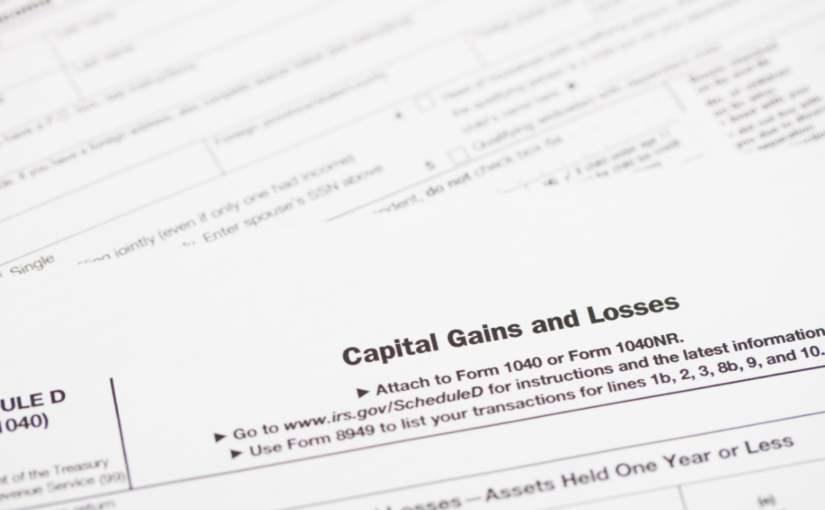back
Capital Gains Taxes and Real Estate Investments
04-2023

Real estate investing can be a profitable method to increase your wealth and safeguard your financial future. Yet it’s crucial to comprehend the financial repercussions of real estate investments, especially with regard to capital gains taxes.
Taxes on capital gains are levied on earnings made from the sale of an asset, such as real estate. A capital gain occurs when you sell a property for more money than you paid for it. You must pay tax on that gain, which is known as capital gains tax.
The length of time you owned the asset before selling it will determine the tax rate on capital gains. The gain is regarded as short-term if you owned the asset for less than a year and is taxed at your regular income tax rate. The gain is regarded as long-term and is taxed at a lower rate if you owned the property for more than a year.
The long-term capital gains tax rate is 15% for the majority of taxpayers, although it can go up to 20% for high earners. Your ordinary income tax rate, which for high earners can be as high as 37%, is applied to short-term capital gains.
Keeping the property for at least a year and a day is one way to reduce the capital gains tax you owe on your real estate assets. As a result, any profit you make from the property will be considered a long-term gain and taxed accordingly.
A 1031 exchange is a different tactic. With a 1031 exchange, you can reinvest the profits from the sale of one property into another one that is similar while deferring paying capital gains taxes. This may be a fantastic strategy to retain your money in your pocket and reduce your tax liability.
Not all real estate investments are subject to capital gains taxes, it’s crucial to remember this. If you own a home as your primary residence and sell it for a profit, you could be eligible to exclude up to $250,000 (or up to $500,000 if you’re married filing jointly) of the gain from your taxable income.
You must have owned the property and used it as your principal residence for at least two out of the five years prior to the sale in order to be eligible for this exception. Using this exclusion can help you pay less in taxes and keep more of the money you make when you sell your house.
Deductions for mortgage interest, property taxes, and depreciation are just a few of the additional tax advantages that real estate investments may offer. These deductions can assist in lowering your taxable income and total tax burden.
To make sure you’re utilizing all of the tax breaks and planning options accessible to you, it’s crucial to engage with a tax expert. Real estate tax regulations can be complicated, and if you are unfamiliar with the tax code, it is simple to overlook significant deductions or make expensive mistakes.
A sound investment plan should be in place in addition to knowing the tax repercussions of real estate investing. Real estate can be a fantastic way to increase wealth, but there are risks involved.
Do your homework and create a clear investment strategy before making a real estate investment. In order to manage your assets, you may need to conduct market research, evaluate possible properties, and assemble a team of experts.
Since real estate investing frequently needs a sizable amount of funds and knowledge, it can be particularly difficult for novice investors. Yet, real estate may be a terrific method to accumulate money and safeguard your financial future with careful planning and a well-thought-out plan in place.
In conclusion, capital gains taxes are a crucial factor to take into account when making real estate investments. You can reduce your tax liability and keep more of your profits by knowing the tax consequences of your investments and employing tactics like holding onto properties for at least a year and a day or using a 1031 exchange.
Also, you may make sure that you’re maximizing your tax savings and limiting your tax liabilities by utilizing tax deductions and consulting with a tax specialist. Before making an investment in real estate, it’s crucial to conduct research and have a sound investment strategy in place.
Real estate investing can be a terrific method to increase your wealth and safeguard your financial future, but you should proceed with caution and thorough planning. You may maximize profits and reduce risks by having a clear investment strategy and understanding the tax consequences of your assets.
In conclusion, real estate investors must take capital gains taxes into account. You may preserve more of your revenues and amass wealth over time by comprehending how these taxes operate and employing ways to reduce your tax liability. Like with any investment, you should conduct research and consult with experts to ensure that you’re making wise choices and reducing your risks.
F2H Capital Group is a debt advisory firm specializing in negotiating the best terms for your commercial real estate projects. The company offers a range of financial products and services, including fixed loans, bridge loans, and construction loans across all asset types. Please contact us for any of your financing needs.

